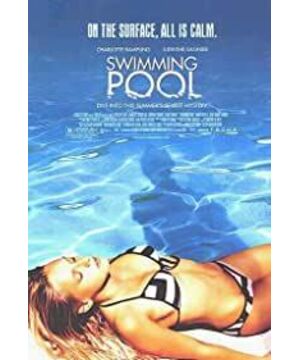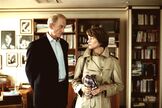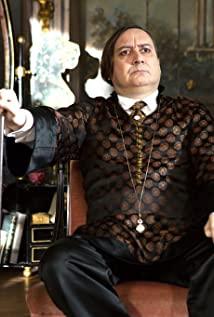How to sort out this movie to make it more reasonable? First of all, I don't fully agree with the view that Julie is a clone of Sarah. If Julie is Sarah's clone, then she should be a character in Sarah's novels, and by no means a fine point. I think the key point of this movie's answer is that from where to where is the plot of Sarah's novel, or whether the whole story is true and there is no plot of the novel. Because when Sarah gave the new book to John, the title was also called "Swimming Pool", so I think the reason why there are so many contradictions in this movie is that everyone did not grasp the core point, that is Sarah's. Where does the novel start and end in the movie, or is it a real event at all? I sorted out four possibilities: 1. This possibility is that from the beginning of the movie until Sarah explained that the manuscripts of the new book "Swimming Pool" were all novels, which also made up for the contradiction of the villa manager. 2. After John invited Sarah to go to a French villa for vacation, Sarah went home and sat on the window sill. The journey after that was all about the plot of Sarah's novel, until Sarah explained the manuscript of the new book. The so-called French travel is just the plot of Sarah's novel. In reality, Sarah didn't go there. Why didn't she go there is an explanation later. 3. This kind of possibility is generally believed in the comments that Sarah’s French vacation is a mix of reality and fiction. They think that the administrator is real, and even to some extent they think that Julie is really in the villa (just in the movie) The real Julie during the vacation in the villa is British Julia), and Sarah just borrowed Julie to express her self-releasing. 4. The last possibility is also very high, that is, Julie does exist, and she is John's illegitimate daughter in France (about this, Julie has already said in the movie), which explains why When Sarah is submitting the manuscript, she will say: "You have something to hide from me." —————————————————————————— —— 1. The first possibility is quite strong, but there is one thing that doesn't make sense, that is John's invitation, because when John invited Sarah, he actually told Sarah that his daughter would go there. So if this paragraph is also the plot of Sarah’s novel, then she doesn’t need to make such a flaw in her novel, because when Julie appeared in the villa later, Sarah obviously didn’t know that Julie was coming (so she put This is the world of Sarah’s novels, but not the previous one) 2. The second is one of the most likely. I think Sarah has a certain kind of disappointment towards John (there may be various reasons, but it may not be just a love issue), and Sarah is also tired of writing bloody murders, so she wants to ask for new changes. The important thing is that she wants to write her own voice. So I think Sarah has never been to a French villa for vacation. The reason is that when John invited Sarah to go to France (which is still reality in the play), he clearly told Sarah that his daughter would go there too. At that time, Sarah’s expression was obviously unwilling and a kind of disappointment (because John Obviously, it is for Sarah to relax writing, but why let her daughter go there to disturb her? So with Sarah's personality, she will definitely not go). So Sarah Vince, who was sitting under the window sill after returning home, did not actually go to France, but started writing this novel at her home in London (that is, from the train to the back before delivery). And all of Julie’s experiences in the novel, the scars on her belly (the drama explained that it was because of a car accident, and I guess Sarah’s mother died in this car accident, because throughout the movie, Sarah is actually a single-parent family, she only has a father ), promiscuity, and the pain of divorce from parents. In fact, these are the experiences of Sarah when she was young in reality. All of these directly led to Sarah's current self-enclosure. And she just borrowed the image of John’s daughter Julia (note that the original name was Julia, with the word "A" removed), and through the unnecessary murder in the novel, "murdered" her own past, and finally achieved release and reconciliation. There is another piece of evidence that Julie’s experience is Sara’s young experience. The important evidence is that Julie’s mother also wrote novels. I guess that Sarah became a writer because her mother was also a writer during her lifetime. (Or love to write) the reason is because of the edification since childhood. And there is another important evidence that can prove that Sarah has not been to the villa. When Sarah took out the new book, John did not ask her if the trip was pleasant or not, and if the prototype of the villa in Sarah’s novel came from John In the real French villa, John would definitely ask Sarah. Not only did John not ask, but instead focused on Sarah's suitability for this kind of story. So it can be shown that the villas, swimming pools and so on are not the real French villas in John's reality. And Sarah has never been to John's villa. She has actually been writing in London. Only in this way can it make sense why John didn't pay attention to his journey and the villa scene in the book when Sarah handed over the manuscript. Finally, there is another point to prove that Sarah has never been to France, that is, Julia came back from vacation when Sarah submitted the paper (when John invited Sarah on vacation, It’s said that Julia will also go to a French villa for vacation, so I can try to understand it this way), so if Sarah also went to France, they are more likely to come back to the country together, if Sarah really went to France It's impossible for Julia not to know her when she is on vacation in the villa. And in this way, the fact that Julia and Sarah don’t know each other at the end makes sense. They don’t know each other at all. The reason why Sarah stood in front of the door and looked at Julie’s closeness with her father could be explained by Sarah. A kind of relief, a kind of gratitude to the past, and even a kind of gratitude to Julia, a strange girl who has never met before, for giving herself inspiration and letting herself release the past. In this way, the plot of the beckoning at the end also makes sense. In fact, the beckoning here has nothing to do with anyone. It is just a reconciliation between Sarah and her when she was young, even with the meaning of saying goodbye to the past. It's just that she borrowed Julia's name and Julie's looks when she was young (or her past). Here I just borrowed the image of the two girls. It has no significance, it is just a symbolic meaning. 3. The third situation, I think it is possible, but there are too many mistakes, because then the role of the administrator has to be justified, but if the administrator has passed, Julie won't make any sense. 4. The fourth is the second most possible, but you can try to think about it. It comes from the difference in the names of Julie and Julia. At the end, when Julia went to find her father, the female secretary called her by her name and thought she was actually Julie. So why not think about it differently, that is that Julie actually exists, and Julie is Julie, Julia is Julia, they are originally two different people, in fact Julie herself has said in the film, Her mother and John are just a foster relationship, in other words Julie is an illegitimate daughter. And when you look closely, Julie revealed more than once in the play that her father was eccentric. When Julie and Sarah met for the first time, Julie asked Sara: "Are you Dad's new love?" It can be seen that Julie has witnessed it more than once. Had a terrible relationship between the sexes of his father. So Julie is just an illegitimate daughter of John in France, and her mother died of some kind of accident, which should be a car accident, which fits in with Julie's statement that she had been in a car accident with scars on her stomach. Because in the play, Sarah sneaked into Julie’s room and found a notebook. There was a picture of a woman in the middle of the book. This woman was Julie’s mother. Since Julie’s mother exists, then Julie should also exist. . Secondly, there is another detail in the film. At the end of Sarah's submission, when John said that Sarah's writing was too subtle and not suitable for her, Sarah joked, "Then what are you going to do with it? Burn it?" Understanding is venting Julie and her mother (because Julie said that John told her mother to burn her own creation). And Sarah herself is disappointed in John Bag, so it happens to be the same as Julie’s emotions about her father’s disregard for herself, and Sara’s experience here can be framed in the role of Julie’s mother, that is, two. Mother and daughter, abandoned or left out by the same man (that is, husband/father), how do they achieve reconciliation, understand and support each other, and even kill the unnecessary expectations and desires of men by killing men. And in the end, Sarah used the novel to bring Julie’s mother back to life, and indirectly, together with Julie and Julie’s mother, reached revenge on John. So this is a return of the female self, a manifestation of self-reliance. . The beckoning at the end can be regarded as such a question. And the change between Julia and Julie at the end of the wave is Sara’s identification with Julie (that is, even if John abandons her, she is no different from Julia, the daughter of the wife of London), and Self-identification. There is still a little detail at the end of the wave, I don’t know if you see it, that is, Sarah was wearing Julie’s mother’s clothes when she waved. Does this also imply that Sarah has replaced herself in the role of Julie’s mother? As for this kind of ending the most convincing What people criticize is that John’s indifferent after receiving the manuscript, but here Sarah just borrowed some of the essence of Julie’s mother’s manuscript, maybe the whole novel framework is not the same as Julie’s mother’s posthumous manuscript, so John I can't fully detect it, but if I look closely, John's performance is still a little faintly noticeable. In fact, ozon has already explained the fourth possibility very clearly, and it's just that we didn't look at it carefully. The reason why everyone feels confused is that everyone regards Julia and Julie as one person, and the character conversion problem that beckons at the end of the film. So I think this movie is actually one of the second and fourth situations. The most likely is the fourth situation. The reason why everyone is so overwhelmed, the reason why everyone understands this movie as the first or third situation, to a large extent, comes from the carelessness and the misleading reason of being misled by the first comment on the comment page. In fact, if you look closely, the director has already explained many points clearly. And this movie is not just about releasing lust, it includes childhood pains, reconciliation with the past, goodbye to the past, women's independence and self-reliance.
——————————————————————————————————————————
The fifth meaning:
Lamplin used this film to express his feelings for his dead sister, while saying goodbye to the past and resurrecting the dead relatives.
Regarding the fifth possibility (in fact, it is not another possibility about the ending, it should be said that it is a supplement to the film creation and thinking), its premise comes from what I accidentally discovered about Lamplin and Ou Anecdotes about Rong in the filming of this movie.
The older sister Sarah who reported the death of mid-brain hemorrhage was originally due to postpartum depression and committed suicide by raising a gun. Her mother's stroke also began. At the age of 21, she had just started her career, she was suddenly caught up in a wave of depression, and suffered a nervous breakdown. When helpless, she even went to the Middle East and Scotland to seek help from religion. In 2003, she met director Ou Rong, and when she was acting in "Swimming Pool", she named her sister for her role, "I feel that after such a long time of avoidance, it is time for her to re-enter my life. NS."
According to this paragraph, we can understand several points. In reality, Lamplin had a sister who committed suicide due to depression, and his mother fell because of this. Then Lamplin participated in the planning and conception of the film, such as the name of the character. Lamplin hopes that through this movie, her dead sister can re-enter her life. So this is actually a movie that integrates many of Lamplin’s personal feelings and experiences. It is a film in which Lamplin expresses his goodbyes and misses his feelings. In the movie, Lamplin takes the name of his dead sister Sarah for the protagonist, and the plot of the dead mother. All these strongly reflect his own life experience. Looking at it this way, the beckoning at the end has another meaning. This is a symbol of Rampling's beckoning goodbye to his dead sister. It also indicates that Lamplin wants to let go of that painful past through this movie, because movies and books have this kind of magic, which can resurrect the dead and the dead. We can stand in the perspective of the person who has left. Understand what she/he would do if she/he were still here and at this time, we can let them live forever-through words and light and shadow, we can know what she wants to express, which indirectly expresses our emotions. So this movie still has the meaning of nostalgia and remembrance. Of course, how many of Lamplin's personal stories are metaphors, such as the passive state and experience of women in the plot, and how many of them can correspond to Lamplin's real experience. This is probably only she herself knows best. But anyway, she finally saw her sister and waved goodbye to her past.
View more about Swimming Pool reviews











